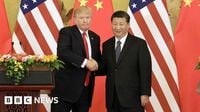In a significant development in the ongoing trade war between the United States and China, President Donald Trump suggested on May 9, 2025, that an "80% Tariff on China seems right!" This statement came as top economic officials from both nations began high-level negotiations in Geneva, aiming to address the escalating tensions marked by substantial tariff increases.
U.S. Commerce Secretary Howard Lutnick stated that Trump is interested in working out a deal with China, indicating a desire to de-escalate the situation. However, Trump's press secretary, Karoline Leavitt, clarified that the U.S. would not lower tariffs unilaterally, emphasizing that China would need to make concessions in any potential agreement.
The trade talks, which took place at the Villa Saladin, an 18th-century mansion owned by the Swiss government, lasted over ten hours. U.S. Treasury Secretary Scott Bessent and Trade Representative Jamieson Greer met with Chinese Vice Premier He Lifeng in a closed-door session, marking a notable moment in U.S.-China relations since the introduction of tariffs by Trump in January.
Despite the lengthy discussions, no immediate breakthroughs were achieved, as both sides faced significant pressure from their respective economies. Trump has been vocal in his criticism of media outlets, particularly targeting MSNBC, which he accused of campaigning for Democrats after they aired a segment questioning the effectiveness of his global tariff strategy. He labeled MSNBC’s host, Stephanie Ruhle, as "highly neurotic" and claimed she was spreading lies about tariffs.
The backdrop of these negotiations is a dire economic landscape for both nations. In recent months, China has reported a decline in consumer prices for the third consecutive month, reflecting the challenges posed by the trade war and sluggish domestic spending. The world's second-largest economy is grappling with persistent deflationary pressures, exacerbated by the tariffs imposed by the U.S. In fact, U.S. tariffs on many imports from China now stand at a staggering 145%, with some products facing cumulative tariffs as high as 245%.
Trade between the U.S. and China was valued at over $660 billion last year, but the ongoing trade dispute threatens to sever economic ties and unsettle global markets. The uncertainty caused by tariffs has also led to the first contraction of the U.S. economy in three years, as industries reliant on Chinese goods express growing concern over supply chain disruptions.
As the talks progressed, both sides sent signals indicating a willingness to negotiate, albeit with a cautious approach. Stephen Olson, a senior visiting fellow at Singapore's ISEAS-Yusof Ishak Institute, noted, "Neither side wants to appear to be backing down." This sentiment was echoed by China's foreign ministry spokesperson, Lin Jian, who emphasized that the talks were being held at the request of the U.S. and framed it as a favor to Washington, responding to the calls of U.S. businesses and consumers.
Moreover, the timing of these negotiations is crucial for both countries. The discussions coincide with Chinese President Xi Jinping’s visit to Moscow, where he attended the Victory Day parade, showcasing China's position as a global leader. This context allows Beijing to project strength while engaging in talks with the U.S.
Factory output in China has taken a hit, with manufacturing activity dipping to its lowest level since December 2023. A recent survey by news outlet Caixin revealed that services activity has also reached a seven-month low. As Chinese exporters face the consequences of steep tariffs, they are exploring markets beyond the U.S., indicating a pragmatic shift in strategy.
Trump himself acknowledged the impact of tariffs on American consumers, stating that children might have "two dolls instead of 30 dolls" due to rising prices caused by the tariffs. His administration is reportedly considering slashing the 145% tariff on Chinese imports by more than half, potentially as early as next week, in an effort to ease tensions ahead of further negotiations.
WTO Director-General Ngozi Okonjo-Iweala described the upcoming trade talks as a "positive" step toward easing ongoing trade tensions, emphasizing the importance of sustained dialogue between the world's two largest economies. While hopes for a major breakthrough remain slim, any progress could provide much-needed relief to global financial markets.
As the discussions continue, the world watches closely to see whether this weekend's talks can begin to mend the rift between the U.S. and China. The stakes are high, with both nations feeling the pressure to reassure increasingly nervous markets and domestic constituencies. With the potential for a "phase one deal on steroids," as experts suggest, the negotiations could address not only tariffs but also other flashpoints in the U.S.-China relationship.
However, experts caution that the systemic frictions that complicate the U.S.-China trade relationship will not be resolved quickly. The Geneva talks may yield only general statements about the desire to maintain dialogue, with substantive agreements taking time to materialize. Ultimately, the outcome of these negotiations could shape the future of global trade and economic relations for years to come.

